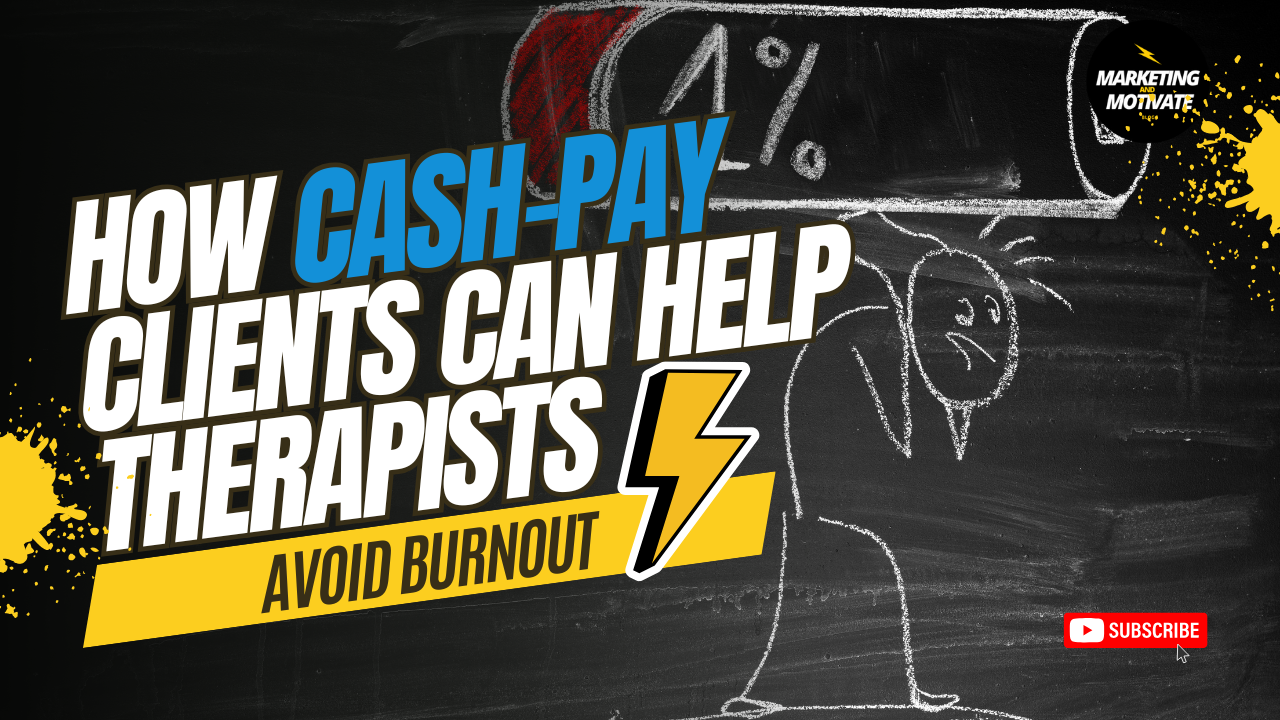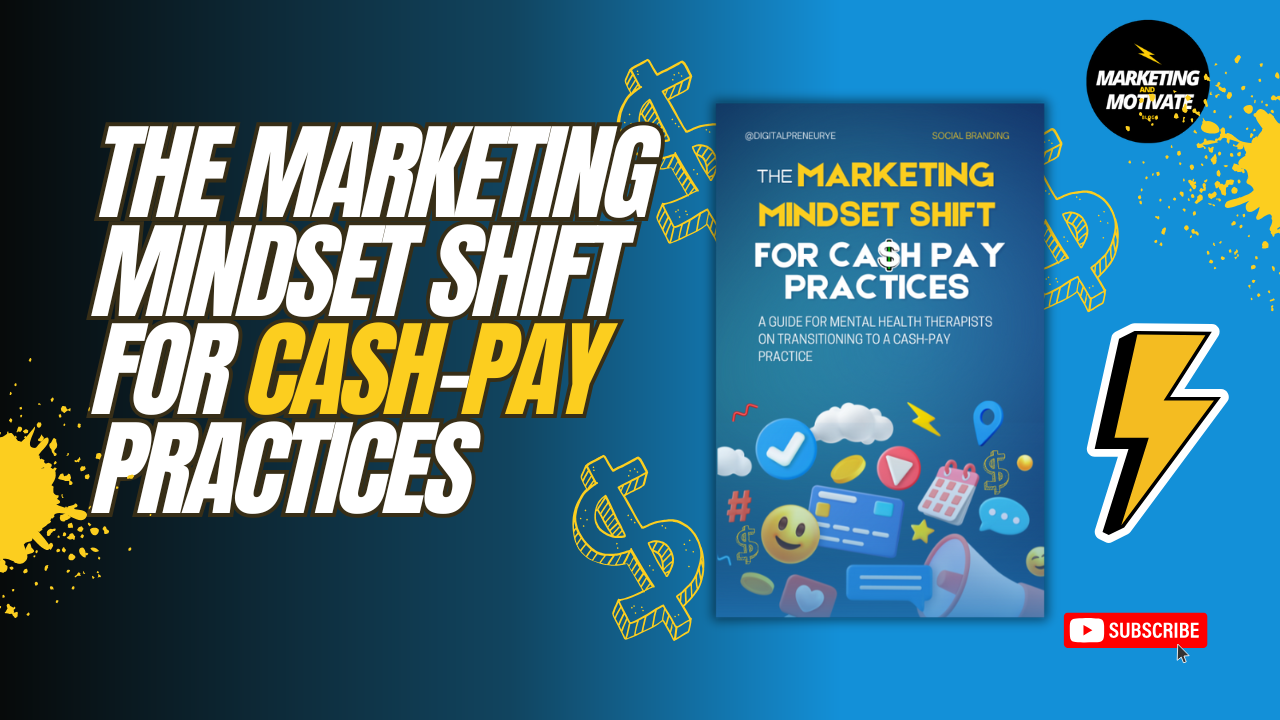How Cash-Pay Clients Can Help Therapists Avoid Burnout 🥵

Burnout is an increasingly common issue among mental health therapists. The emotional toll of supporting clients, coupled with the administrative burdens of running a practice, can leave therapists feeling overworked, undervalued, and exhausted. For those operating within the constraints of an insurance-based model, burnout is often exacerbated by low reimbursement rates, high caseloads, and excessive paperwork.
But there’s an alternative. Transitioning to a cash-pay model can significantly reduce burnout by freeing therapists from the constraints of insurance, allowing them to reclaim their time, energy, and passion for their work.
This article explores the ways moving away from insurance and focusing on cash-pay clients can help therapists reduce burnout while creating a thriving, sustainable practice.

Understanding Therapist Burnout in Insurance-Based Practices
What is Therapist Burnout?
Burnout is a state of emotional, physical, and mental exhaustion caused by prolonged stress. It’s characterized by:
- Emotional Exhaustion: Feeling drained and unable to give your best to clients.
- Reduced Satisfaction: Losing the sense of accomplishment and fulfillment in your work.
- Overwhelm and Detachment: Struggling to meet the demands of your practice, leading to feelings of cynicism or detachment from your role.
According to recent studies, burnout rates among mental health professionals are alarmingly high, with insurance-related challenges often cited as a contributing factor.
How Insurance-Based Practices Contribute to Burnout
- Administrative Overload:
- Therapists spend countless hours managing claims, billing, and audits.
- Time spent on paperwork often exceeds time spent with clients, leading to frustration.
- Reduced Autonomy:
- Insurance dictates treatment plans, session lengths, and reimbursement rates.
- Therapists often feel their professional judgment is undermined by insurance policies.
- Low Reimbursement Rates:
- Insurers set rates that don’t reflect the therapist’s expertise or the true value of their work.
- To make ends meet, therapists are forced to take on more clients, increasing their workload and stress.
The Emotional Toll of Insurance-Based Therapy
- Feeling Undervalued: Insurance companies’ low reimbursement rates and frequent rejections can leave therapists feeling unappreciated.
- Frustration Over Lost Time: Administrative tasks detract from time that could be spent with clients or on self-care.
- Stress from Constant Changes: Navigating updates to insurance policies and procedures adds an additional layer of complexity.
How a Cash-Pay Model Can Help Reduce Burnout
Freedom from Administrative Overload
- No More Claims and Billing Stress:
- Cash-pay eliminates the need to submit insurance claims or follow up on denied reimbursements.
- Therapists can streamline operations, focusing on client care instead of administrative tasks.
- Streamlined Practice Management:
- Reduced paperwork means fewer hours spent on non-billable tasks.
- Therapists can reallocate time to growing their practice or personal well-being.
Increased Financial Stability and Earning Potential
- Set Your Own Rates:
- Therapists can charge fees that accurately reflect their expertise and the value they provide.
- Higher rates allow therapists to work with fewer clients while maintaining or increasing income.
- Timely Payments:
- Cash-pay ensures immediate payment, eliminating the delays associated with insurance reimbursements.
- Smaller Caseloads, Better Work-Life Balance:
- With higher rates and fewer clients, therapists can achieve financial stability without overloading their schedule.
Enhanced Client Relationships
- More Personalized Care:
- Therapists have the freedom to tailor treatment plans to each client’s unique needs, without the constraints of insurance policies.
- Committed Clients:
- Cash-pay clients are often more invested in their therapy, leading to stronger engagement and better outcomes.
- Improved Job Satisfaction:
- Focusing on motivated, engaged clients restores therapists’ passion and purpose, reducing feelings of burnout.
Additional Benefits of Moving Away from Insurance
Greater Autonomy and Flexibility
- Control Over Practice Decisions: Therapists can set their own session lengths, treatment goals, and scheduling policies.
- Prioritize Self-Care: With fewer constraints, therapists can create a schedule that supports their mental and physical well-being.
More Time for Professional Development
- Pursue Specializations: Therapists can focus on niche areas of interest, attracting clients willing to pay for expertise.
- Invest in Growth: Reduced administrative burden allows time for certifications, workshops, and other professional pursuits.
- Enhance Thought Leadership: A focus on cash-pay clients can position therapists as experts in their field, boosting their professional reputation.
A More Balanced Work-Life Dynamic
- Reduced Stress: Freed from the administrative and financial pressures of insurance, therapists can focus on their own well-being.
- More Time for Personal Life: Smaller caseloads and flexible schedules create space for family, hobbies, and self-care.
- Greater Career Satisfaction: Autonomy and balance contribute to long-term career fulfillment.
Steps to Transition to a Cash-Pay Practice
If transitioning to cash-pay sounds appealing, here are some actionable steps to get started:
1. Evaluate Your Current Practice
- Assess Your Administrative Load: Calculate how much time and money you currently spend on insurance-related tasks.
- Understand Your Client Demographics: Determine whether your ideal clients are willing and able to pay out-of-pocket for therapy.
2. Plan Your Transition Strategy
- Start Gradually: Reduce your participation in insurance panels one at a time, allowing a smoother transition for your clients and practice.
- Communicate with Clients: Be transparent about your decision and provide resources or referrals for clients who cannot continue with cash-pay.
3. Develop a Strong Marketing Plan
- Update Your Online Presence: Revamp your website and profiles to reflect your new cash-pay status.
- Highlight the Benefits of Cash-Pay: Use your marketing materials to emphasize personalized care, fewer restrictions, and better outcomes.
- Leverage SEO: Target keywords like “cash-pay therapist” or “private pay mental health services” to attract the right audience.
Addressing Common Concerns about Cash-Pay
What About Clients Who Can’t Afford Cash-Pay?
- Sliding Scale Options: Consider offering a limited number of sliding-scale slots for clients with financial constraints.
- Payment Plans: Flexible payment arrangements can make therapy more accessible without compromising your cash-pay model.
- Provide Referrals: Connect clients who cannot afford cash-pay services with other therapists or resources that accept insurance.
Will I Lose Too Many Clients?
- Attracting the Right Clients: Cash-pay clients tend to value and engage more deeply in therapy, leading to better outcomes and greater satisfaction.
- Smaller, More Committed Client Base: Even with fewer clients, higher rates can sustain your practice financially.
Can I Compete with Insurance-Based Practices?
- Position Yourself as an Expert: Highlight your specializations and the unique benefits of your approach to attract clients who prioritize quality care.
- Educate Your Audience: Use your website and consultations to explain why cash-pay therapy offers a superior experience.
Reclaiming Your Practice and Reducing Burnout
Burnout is a serious issue for therapists, but it doesn’t have to define your career. Transitioning to a cash-pay model offers a pathway to reduced stress, greater financial stability, and more fulfilling client relationships. By moving away from insurance, you can create a practice that aligns with your values and supports your well-being.
If you’re ready to take the next step, explore resources or join a community of therapists who are where you are at and looking to transition to cash-pay. Click the button below to learn more about joining our community of therapist.

It’s not just about growing your practice—it’s about rediscovering the joy and purpose in your work.
Also, there's more!
Make sure you grab our free eBook, "The Marketing Mindset Shift for Cash-Pay Practices"
The demand for mental health services is growing, and more clients than ever are willing to pay out-of-pocket for personalized, high-quality care. However, making the shift to a cash-pay practice requires more than just removing insurance from your business model—it requires a clear strategy and a mindset that embraces abundance, value, and long-term growth.
This eBook is designed to guide you through the mindset shift, helping you build confidence, connect with your ideal clients, and create a practice that thrives. 👇


